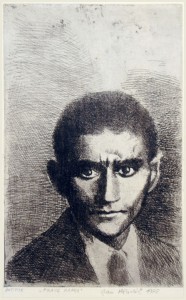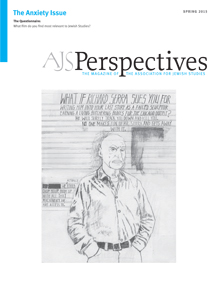If until now our whole person had been oriented towards the work of our hands, towards that which was seen by our eyes, heard by our ears, towards the steps made by our feet, now we suddenly turn ourselves entirely in the opposite direction, like a weather vane in the mountains. Franz Kafka, Diaries (1910)

Specific fears and anxieties are openly addressed in Kafka's diaries and letters, and Kafka's frequently ironic, playful, or satiric representation of these anxieties is often ignored. Kafka's famous "Letter to His Father" (1919) is understood as an expression of Kafka's tortured soul, and Wilhelm Emrich speaks for many when he claims, "all the anguish of his childhood is still not overcome." Yet, Kafka cautioned his lover, Milena Jesenská, not to forget that it is a "lawyer's letter." Writing was Kafka's way of externalizing and controlling his anxieties and constituted an act of rebellion. His linguistic skills enabled him to dissipate his protagonists' anxieties in many directions, while opening doors leading towards new paths and even into entirely opposite directions, "like a weather vane in the mountains."
Kafka's "Letter to His Father" can easily be turned into other and opposing directions: he does so himself when he allows his father to contradict him at the end. Nadine Gordimer responded to Kafka's reversal of the narrative structure with her own parodic "Letter from His Father" (in Something Out There [1984]), developing the father's point of view. The ghost of Herrmann Kafka is conjured up from the dead and an outraged father challenges Kafka's representation of his paternal self. But Gordimer created a caricature of Kafka's father, exposing his narrow middle-class values and presuppositions, and highlighting the political implications of the father-son conflict.
Decency, respect, to be "a man," to "work properly," to do one's "duty" are bourgeois clichés that Herrmann Kafka believed in. A "normal" young man was supposed to have "a decent marriage" with a devoted wife and children in "a home of his own." Herrmann Kafka could not understand that his son felt so anxious about marrying. "How is any ordinary human being to understand that." He was also very concerned about his social status and disliked the lower-class Yiddish actors with whom Kafka associated in 1911–12, as well as Kafka's last eastern European girlfriend Dora Dymant for "cooking like a gypsy on a spirit stove. . . . I had to turn my back on her at your funeral" (Gordimer). He was a "man" who loved the Austrian army, sang soldier songs, and Kafka's anxiety about these expectations surfaced in a dream about his father watching the soldiers and exclaiming, "That's something to look at as long as one can!" (Diaries)
Gordimer fills in the social and political background for Kafka's anxieties, which Kafka took largely for granted, though he did identify his father's values as typical of the assimilated Jewish middle class. He recognized that his father's inflexible, anti-intellectual stance, as well as his black-and-white view of the world, represented the locus for totalitarian thought. "From your armchair you ruled the world. Your opinion was correct, every other was mad, wild, meshugge, not normal." Kafka also addressed the political dimension when he compared his father to "all tyrants . . . whose rights are based on their person and not on reason." Gordimer, by giving the father a voice, makes the reader see the father's prejudice, racial stereotypes, and petty middle-class morality. By removing Kafka's letter from the intensely personal level to a political one, Gordimer shows how Kafka's anxieties resonated as much in the postcolonial situation of Gordimer's South Africa during apartheid as they related in Kafka's time to the clash in Prague between assimilated Jews and Zionists, German Jews and Czech Jews, Jews and Gentiles.
Much of Kafka's literature can be seen as creative variations on the theme of anxiety. Perhaps his father's deprecatory remark about Kafka's friend, the Yiddish actor Löwy, "If you lie down with dogs, you get up with fleas," did inspire Gregor Samsa's transformation into vermin in The Metamorphosis; yet, the vermin metaphor was also a commonplace in anti-Semitic discourse. Kafka's caricature of the Christian family through exaggerated religious gestures and exclamations, as well as the ironic Christ imagery that accompanies Gregor's death, suggests that the text is partly a satire of contemporary anti-Semitism. However, Gregor's metamorphosis is initially not an immediate death sentence but gives him breathing space from the pressures of work and family responsibilities. Indeed, the very sight of the monstrous vermin chases the manager away, who has arrived in person to pressure Gregor to go to work. Ironically, Gregor is anxious to make the manager stay and "we suddenly turn ourselves entirely in the opposite direction" when not only the Christian family and the manager at work, but also Gregor, become the object of Kafka's satire. The humorous description of Gregor's unsuccessful attempts to prevent the manager from leaving suggests a Chaplinesque tragicomedy. The sight of Gregor suddenly in front of her "rocking with repressed motion" makes the mother first jump up into the air and then sit on the table and knock over the coffee. This leads Gregor to "snap his jaws several times in the air," which makes his mother faint. The climax is reached when the manager jumps down the stairs. The importance of gesture and sound in this situation comedy has a strong theatrical effect and quite possibly goes back to Kafka's experience of the Yiddish theatre.
The existential anxiety of Joseph K. in The Trial, who is arrested without having committed a crime, and attempts to vindicate himself throughout the novel, is also represented humorously. Max Brod testified that "we friends of his could not stop laughing when he read out the first chapter of The Trial. He himself laughed so much that there were moments when he couldn't read any further." There are several scenes where K. entangles himself in a linguistic trap when he qualifies individual utterances until they are transformed, distorted, or turned into their opposite. Moreover, the central scene of the novel—when the priest in the cathedral summons K. and subjects him to the parable "Before the Law" with its midrashic commentary—from the outset introduces a humorous note because the priest "stood [there] for a while, looking around him without moving his head." This is one of those curious theatrical gestures that Walter Benjamin pointed out long ago in his seminal Kafka essay from 1934. K.'s tremendous anxiety when confronted by the priest is deflected twofold through caricature and parody: not only is the rebellious K. parodied as an 'am ha-'arez before the Law (because he is ignorant of Scripture and the Law contained within it), but surely a priest who talks like a rabbi is a comic subject.
Though Kafka was very sympathetic to the Zionist movement, tenacious enthusiastic Zionists did not escape his sharp irony. "Blumfeld, an Elderly Bachelor" (1915) caricatures the Zionist leader Kurt Blumenfeld, whom Kafka knew and liked, and who was an inspiration to many young Zionists. Apart from the obvious sexual connotations, the reference to Zionism is explicit in Blumfeld's companions, the "two small white celluloid balls with blue stripes," blue-white being the colors of the Jewish flag. Blau-Weiss was also the name of the first Zionist Youth movement (1912–1929) in Germany, whose principal leaders were Blumenfeld and Felix Rosenblüth. The bouncy, hyper, blue-white balls quickly make Blumfeld's life hell, hounding him wherever he goes. Blumfeld eventually takes control of his sexual anxieties by imprisoning the balls in the wardrobe and escapes into fresh air. His frustration is then transferred onto his assistants at work, who (like the balls before them) complicate his life, and work-related stress emerges as the source of his anxieties all along.
Jewish assimilation was a major cause of anxiety in Kafka's Zionist circles. Max Brod immediately identified Kafka's "A Report to an Academy" (1917) as "the most original satire of assimilation which has ever been written!" This political reading sees the ape Rotpeter as a caricature of the Jewish assimilationist who is overly sensitive about drawing attention to his "true" identity. Though he finds his "half- trained chimpanzee wife" waiting for him at the end of the day and "takes comfort from her as apes do," he is paranoid about being seen with her in public because "she has the insane look of the bewildered half- broken animal in her eye." The ape's behavior accords with Sander Gilman's observation of "how Jews see the dominant society seeing them and how they project their anxiety about this manner of being seen onto other Jews as a means of externalizing their own status anxiety" (Jewish Self-Hatred).
Kafka's anxiety about increasing anti-Semitism is reflected in "A Little Fable" (1920), in which a mouse comments that she finds the world is getting smaller every day. She has been running and running but finally she has reached the last room. If she keeps running now she will run straight into the trap in the corner. "You only have to change your direction," said the cat, and then it ate her. Although there is much anxiety in Kafka's writings, Kafka speaks up and vocalizes his concerns. Kafka's chronicle of anxieties is his own "possession," created within "the marvelous field for play" which Benjamin perceived long ago. His stories are a "burrow of art," a creative space where new paths are forged continuously in many directions. By chronicling his anxieties with humor and ironic distance, Kafka affirms the last words in his diaries, "Every word . . . becomes a spear turned against the speaker. Most especially a remark like this. And so ad infinitum. The only consolation would be: it happens whether you like or no. . . . More than consolation is: You too have weapons."

